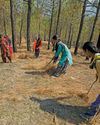
THERE IS a mindset change in our approaches, evident in the past two decades. Compared to the 1980s and 1990s, many of us are now after quick-fix solutions. Initiatives like Jalyukt Shivar Abhiyan, a Maharashtra government initiative of 2014 that targeted river widening, deepening and straightening to make the state drought-free by 2019; Water Cups, a competition initiated by non-profits in 2016 to incentivise Maharashtra villages to harvest water for drought-proofing the state; and planting trees along the banks to rejuvenate rivers are all examples of such quick-fix solutions. Watershed-based development, which involves management of land and vegetation to conserve the quality and supply of water, is no more fashionable, because it takes seven-eight years to complete, stabilise and show results. Nonprofits known for their good watershed development projects, which would earlier have argued for longer watershed projects, are now queuing up for quick-fix solutions like the Jalyukt Shivar Abhiyan. This is also aided by access to quick and easy money through the corporate social responsibility (CSR) route for such works.
CRITICAL ENGAGEMENT
In the 1980s and 1990s, there was a culture amongst most non-profits and civil society organisations to engage in more of "critical engagement" or make sense of the various interventions and projects from a political economy perspective (how political forces affect the economy and vice versa). This is slowly getting eroded. We are more into "thin-king like the state" or "thinking like the corporates", especially with substantial money into the sector coming from the corporates under CSR.
Esta historia es de la edición July 16, 2023 de Down To Earth.
Comience su prueba gratuita de Magzter GOLD de 7 días para acceder a miles de historias premium seleccionadas y a más de 9,000 revistas y periódicos.
Ya eres suscriptor ? Conectar
Esta historia es de la edición July 16, 2023 de Down To Earth.
Comience su prueba gratuita de Magzter GOLD de 7 días para acceder a miles de historias premium seleccionadas y a más de 9,000 revistas y periódicos.
Ya eres suscriptor? Conectar

THE CIRCULARITY ARGUMENT
A circular economy can help India achieve its developmental aspirations while following the low-carbon pathway. It will also help address the challenges of waste management, pollution and overexploitation of natural resources. Industries are already innovating to reuse high-volume wastes and have shown that the transition can usher in both environmental and financial windfalls

Banking on flawed drug voluntary licences
The Medicines Patent Pool is pushing for more VLs, but its bad deal with Novartis on a cancer drug shows the pitfalls

Lasting solutions
For the first time, the UN has recognised the role of indigenous communities in tackling aridity. A repository of traditional knowledge India has the wherewithal to lead the way

IMD at 150
India's journey into modern weather forecasting took a decisive turn 150 years ago with the establishment of India Meteorological Department during the British rule. The agency has come a long way since then, shaping the way the country predicts and responds to its diverse climate challenges

Every drop counts
In drought-prone Marathwada region, 14 villages have managed to counter water shortage by budgeting the resource

Threat to survival
Hollongapar Gibbon Sanctuary in Assam faces ecological challenges as railway electrification and hydrocarbon exploration endanger its fragile biodiversity

'Migration is going to be a battlefield'
AMITAV GHOSH is one of the foremost chroniclers of our times. His literary sojourn includes writings on topics that range from languages to climate change to human lives. His latest book, Wild Fictions, brings some of his works on these issues under one title. In a conversation with RAJAT GHAI, Ghosh shares his views on the future of human movement. Excerpts:

Face of future
California wildfires confirm forest fires are intensifying in a hotter world, emitting substantial amounts of greenhouse gases and reinforcing global warming

Friends of the forest
Residents of 30 villages in Uttarakhand establish a model for public participation in saving forests from wildfires

Climate-crazy playbook
Just hours after his second (and final) term began on January 20, US President Donald Trump unleashed 46 presidential actions. Several of these are centred on the US' climate commitments, energy transition, migration and trade policies, and are likely to have negative global implications